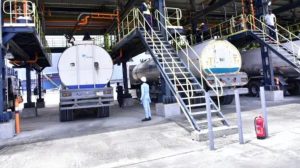The Imperative of Sustainable Practices for Nigeria’s Consumer Packaged Goods Manufacturers
Nigeria’s consumer packaged goods (CPG) industry faces a critical juncture, where traditional profit-driven models must give way to sustainable practices that ensure long-term resilience. Schneider Electric, a global leader in energy management and automation, has emphasized the urgency of this transformation, urging Nigerian CPG manufacturers to prioritize sustainability alongside profitability. The prevailing notion that these two objectives are mutually exclusive is a misconception, according to Ajibola Akindele, Country President of Schneider Electric. He argues that innovative strategies and targeted investments can effectively harmonize economic performance with environmental stewardship. This necessitates a fundamental shift in approach, embracing three transformative trends: electrification, digital transformation, and circularity.
Electrification: Transitioning from Diesel to Sustainable Energy Solutions
The Nigerian CPG sector, particularly the food and beverage segment, heavily relies on energy-intensive processes, often powered by diesel generators. This dependence on diesel not only contributes to environmental pollution but also exposes manufacturers to fluctuating fuel costs and potential power outages. Electrification, a strategic move away from diesel, offers substantial benefits in terms of efficiency, cost reduction, and environmental impact. However, this transition requires meticulous planning and investment. Electrical audits are essential to assess existing infrastructure and identify areas for improvement. Furthermore, investment in reliable energy solutions like microgrids, solar hybrid systems, and power purchase agreements is crucial. These technologies provide manufacturers with stable power supply, reduce reliance on fossil fuels, and contribute to a significant reduction in carbon emissions. By transitioning to electric alternatives, CPG manufacturers can achieve substantial cost savings, enhance operational uptime, and minimize their environmental footprint.
Digital Transformation: Leveraging Technology for Enhanced Efficiency and Agility
Digitalization is rapidly transforming the manufacturing landscape, offering unprecedented opportunities for enhanced efficiency, data-driven decision-making, and operational agility. Smart sensors, cloud-based platforms, and AI-driven analytics empower Nigerian manufacturers with real-time insights into their production processes, warehousing, and distribution networks. This visibility allows for proactive identification of bottlenecks, optimization of resource allocation, and improved product quality. However, merely implementing these technologies is insufficient. To fully realize the potential of digitalization, companies must invest in process improvement and workforce upskilling. Predictive maintenance and digital twin technologies, for instance, are already revolutionizing manufacturing operations in key industrial hubs like Lagos, Aba, and Kano. By embracing digital transformation, CPG manufacturers can enhance product quality, minimize downtime, boost operational efficiency, and gain a competitive edge in the market.
Circularity: Redefining Resource Management and Waste Reduction
The circular economy model, characterized by minimizing waste and maximizing resource utilization, is gaining traction across industries. For CPG manufacturers, circularity entails a fundamental shift in how they manage raw materials, packaging, and waste. Ingredient optimization, sustainable packaging materials sourced from local resources like cassava starch, and repurposing off-spec products are some of the key practices being adopted. Regulatory pressures, such as Extended Producer Responsibility (EPR) regulations from the National Environmental Standards and Regulations Enforcement Agency (NESREA) and the Lagos Waste Management Authority (LAWMA), are further incentivizing takeback and recycling efforts. Consumer preferences also play a significant role, with a growing segment of urban buyers demonstrating a strong preference for brands with demonstrable sustainability commitments. Embracing circularity not only reduces environmental impact but also presents opportunities for cost savings and enhanced brand reputation.
Integrating Sustainability for Long-Term Growth and Resilience
The convergence of electrification, digitalization, and circularity presents Nigerian CPG manufacturers with a unique opportunity to redefine their operations and secure their future in a rapidly evolving market. These three pillars are no longer mere buzzwords but essential competitive imperatives. Companies that adopt this integrated approach will not only enhance their profitability but also build resilience in a market increasingly driven by values and sustainability concerns. The transition may require significant investment and strategic adjustments, but the long-term benefits far outweigh the initial costs.
Schneider Electric’s Commitment to Supporting Sustainable Transformation
Schneider Electric has reiterated its commitment to supporting Nigerian CPG companies in their journey towards sustainability. The company is actively involved in enabling smart factories, promoting circular innovations, and providing solutions that help manufacturers translate their sustainability ambitions into tangible actions. By leveraging Schneider Electric’s expertise and technologies, Nigerian CPG manufacturers can accelerate their transition to a more sustainable and profitable future. This collaborative approach is essential for driving systemic change within the industry and creating a more environmentally conscious and economically vibrant CPG sector in Nigeria.
The Future of Nigeria’s CPG Sector: A Call to Action
The Nigerian CPG sector stands at a crucial crossroads. The choice is clear: embrace sustainable practices and thrive, or cling to outdated models and face increasing challenges in a market rapidly shifting towards environmentally conscious consumers and stricter regulatory landscapes. The time for decisive action is now. By integrating electrification, digitalization, and circularity into their core business strategies, Nigerian CPG manufacturers can unlock new avenues for growth, enhance their competitiveness, and contribute to building a more sustainable and prosperous future for Nigeria. This transformative journey requires collaboration, innovation, and a commitment to long-term value creation, both for businesses and the environment.













